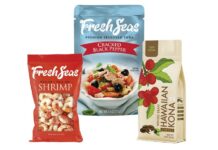Scientists from Case Western Reserve University are pioneering a groundbreaking “smart packaging” system that is poised to revolutionize the monitoring of perishable food products during their transportation. Spearheaded by Chanyong (Chase) Cao, an assistant professor who leads the research team, this innovative approach has the potential to transform supply chains, decrease expenses, and ensure higher-quality food for consumers.
The primary objective of this system is to oversee temperature variations, shifts in moisture levels, and the presence of pathogens in perishable food items while they are in transit. At the core of this novel system lies a compact, self-powered monitoring device equipped with flexible sensors and an energy harvester. These sensors leverage desiccants, which are moisture-absorbing pellets commonly found in packaging, to capture and store ambient energy.
What’s particularly impressive is that this energy is generated through the vibrations of the delivery trucks themselves. This real-time monitoring system furnishes valuable digital insights regarding the temperature, moisture content, and spoilage conditions of packaged food. The ingenious invention, known as the desiccant-based triboelectric nanogenerator (D-TENG), extends the longevity of the monitoring system.
A remarkable feature of this technology is its eco-friendliness. Unlike conventional battery-powered systems that are costly and environmentally harmful, the D-TENG system presents a sustainable alternative. While some modern transport companies currently utilize sensors to monitor conditions during transit, their reliance on traditional batteries remains a drawback. Furthermore, these systems often lack the capability to provide real-time data for detecting food spoilage.
The innovative approach pursued by Cao’s team directly addresses these limitations and holds immense promise for the future of food transportation. This research is aligned with the World Bank’s mission to reduce food waste by emphasizing improved technology for preserving perishable goods throughout the supply chain. While the team has not yet tackled the challenge of enhancing cooling mechanisms for perishable food during transit, they have taken the pivotal initial step of identifying potential real-time issues.
Presently, the team is in the process of assembling a functional prototype, with the intention to ramp up production and introduce this transformative technology to the market within the next five years. Beyond its application in preventing food spoilage, Cao envisions this technology benefiting vaccine shipments, providing companies and government agencies with critical real-time temperature information necessary for the secure transportation of these vital products.
The researchers affirm that this groundbreaking “smart packaging” innovation bodes well for the future of the food industry and essential supply chains, ushering in a brighter and more sustainable era.



























